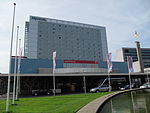Organisation for the Prohibition of Chemical Weapons

The Organisation for the Prohibition of Chemical Weapons (OPCW) is an intergovernmental organisation and the implementing body for the Chemical Weapons Convention (CWC), which entered into force on 29 April 1997. The OPCW, with its 193 member states, has its seat in The Hague, Netherlands; it oversees the global endeavour for the permanent and verifiable elimination of chemical weapons. The organisation promotes and verifies the adherence to the Chemical Weapons Convention, which prohibits the use of chemical weapons and requires their destruction. Verification consists both of evaluation of declarations by member states and onsite inspections. The organisation was awarded the 2013 Nobel Peace Prize "for its extensive efforts to eliminate chemical weapons". Nobel Committee chairman Thorbjørn Jagland said, "The conventions and the work of the OPCW have defined the use of chemical weapons as a taboo under international law".
Excerpt from the Wikipedia article Organisation for the Prohibition of Chemical Weapons (License: CC BY-SA 3.0, Authors, Images).Organisation for the Prohibition of Chemical Weapons
Johan de Wittlaan, The Hague Scheveningen
Geographical coordinates (GPS) Address Website External links Nearby Places Show on map
Geographical coordinates (GPS)
| Latitude | Longitude |
|---|---|
| N 52.091241 ° | E 4.283193 ° |
Address
Organisation for the Prohibition of Chemical Weapons
Johan de Wittlaan 32
2517 JR The Hague, Scheveningen
South Holland, Netherlands
Open on Google Maps







